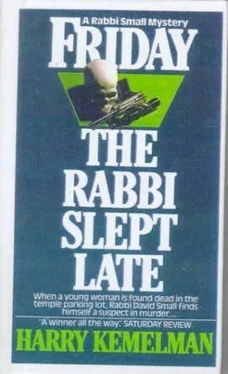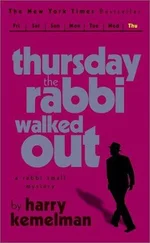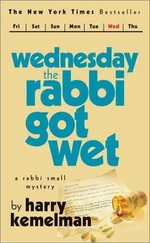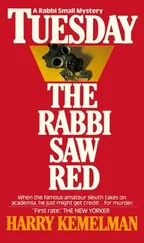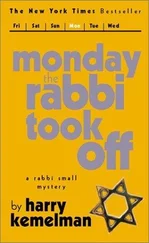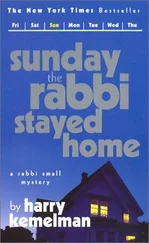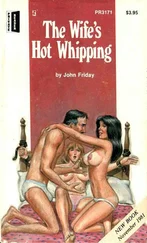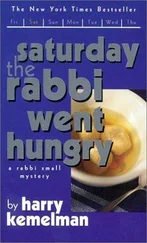Harry Kemelman - Friday The Rabbi Slept Late
Здесь есть возможность читать онлайн «Harry Kemelman - Friday The Rabbi Slept Late» весь текст электронной книги совершенно бесплатно (целиком полную версию без сокращений). В некоторых случаях можно слушать аудио, скачать через торрент в формате fb2 и присутствует краткое содержание. Жанр: Детектив, на английском языке. Описание произведения, (предисловие) а так же отзывы посетителей доступны на портале библиотеки ЛибКат.
- Название:Friday The Rabbi Slept Late
- Автор:
- Жанр:
- Год:неизвестен
- ISBN:нет данных
- Рейтинг книги:5 / 5. Голосов: 1
-
Избранное:Добавить в избранное
- Отзывы:
-
Ваша оценка:
- 100
- 1
- 2
- 3
- 4
- 5
Friday The Rabbi Slept Late: краткое содержание, описание и аннотация
Предлагаем к чтению аннотацию, описание, краткое содержание или предисловие (зависит от того, что написал сам автор книги «Friday The Rabbi Slept Late»). Если вы не нашли необходимую информацию о книге — напишите в комментариях, мы постараемся отыскать её.
Friday The Rabbi Slept Late — читать онлайн бесплатно полную книгу (весь текст) целиком
Ниже представлен текст книги, разбитый по страницам. Система сохранения места последней прочитанной страницы, позволяет с удобством читать онлайн бесплатно книгу «Friday The Rabbi Slept Late», без необходимости каждый раз заново искать на чём Вы остановились. Поставьте закладку, и сможете в любой момент перейти на страницу, на которой закончили чтение.
Интервал:
Закладка:
"Just a minute," said Miriam, "that one in the rear ashtray can't be mine. I've never sat in the back seat since we got the ear."
"What's that? Never sat in the back seat? That's impossible."
"Is it?" asked the rabbi mildly. "I have never sat in any seat but the driver's seat. Actually, the back seat has never been used, come to think of it. Since we got the car, less than a year ago, I have never had occasion to transport anyone. When I am in the car, I am in the driver's seat, and when Miriam comes along she sits beside me. What is so strange about that? How often do you sit in the back seat of your car?"
"But it must have got there somehow. The lipstick is your wife's, the brand of cigarette is hers. Look here, here's a list of what was in the girl's handbag. No cigarettes, you notice."
The rabbi studied the list. Then he pointed. "But there's a cigarette lighter, and that would indicate that she smoked. As far as the lipstick goes, you said it was the same brand and shade as Miriam's. After all, they're both blondes."
"Just a minute," said Lanigan. "The bobby pin was found in the back of the car, so you must have-"
Miriam shook her head. "Sitting in the front seat, it would be in the back that the pin would fall."
"Yes, I suppose so," said Lanigan, "but it still doesn't give us what you'd call a clear picture. She had no cigarettes-at least there were none in her purse, right?"
"Right, but she was not alone. There was someone with her-the murderer-and he probably had cigarettes."
"Are you saying that the girl was murdered in your car, rabbi?"
"Precisely. The lipstick-stained cigarette in the rear ashtray proves that a woman was in the rear seat of my car. The handbag on the floor in the rear shows that it was Elspeth Bleech."
"All right, let's say she was there. Let's even grant she was killed in your car. How does that help Bron-stein?"
"I'd say it clears him."
"You mean because he had a car of his own?"
"Yes. Why would he drive into the parking lot with the girl, park alongside my car, and then change cars?"
"He might have killed her in his own car and then transferred the body to your car."
"You're forgetting the cigarette in the rear ashtray. She was alive in my car."
"Suppose he forced her into your car."
"For what reason?"
Lanigan shrugged. "Perhaps to avoid having any signs of struggle in his own car."
"You're not giving that cigarette its full weight as evidence. If she smoked that cigarette in the rear seat of my car, then she was at ease. No one had his hand at her throat-no one was threatening her. For that matter, if after taking off her dress she had to go back to Bronstein's car for some reason, why would she have put on the raincoat?"
"Because it was raining, of course."
The rabbi shook his head impatiently. "The car was right in front of the house. How far? Fifty feet? She had put on a topcoat to cover her slip, and that certainly was protection enough against the rain for such a short run."
Lanigan rose and began to pace the floor. The rabbi watched him, unwilling to interrupt his train of thought. But when he continued silent, the rabbi said, "Bronstein should have come to the police as soon as he found out what happened, admitted. For that matter, he shouldn't have picked up the girl in the first place. But even if you can't condone it, it is understandable in the light of the situation at home. And again you can't condone his withholding information from the police, but you can understand it. Arresting him for questioning, with its attendant publicity, is more than enough punishment, don't you agree? Chief Lanigan, take my advice and let him go."
"But that would leave me without a suspect."
"That's not like you."
"What do you mean?" The chief's face reddened.
"I can't imagine you holding a man just so that you can report progress to the press. Besides, it will only hamper your investigation. You'll find yourself thinking about Bronstein, trying to evolve theories that put him in the picture, checking his past, interpreting whatever new evidence comes up, from the point of view of his possible involvement. And that's obviously the wrong direction for your investigation to take."
"Well…"
"Don't you see, you've got nothing on him other than his failure to come forward."
"But the D.A. is coming down in the morning to question him."
"Then tell him he'll turn up voluntarily. I'll go bond for him. I'll guarantee his appearance when you want him."
Lanigan picked up his dispatch case. "All right, I'll let him go." He went to the door, and with his hand on the knob he paused. "Of course, rabbi, you realize that you haven't exactly improved your own position."
22
Al Becker was not one to forget a favor. The morning after his partner was released, he went to see Abe Casson to thank him personally for his good offices in the matter.
"Yeah, I spoke to the district attorney but I didn't get far. As I told you, this case is being handled pretty much by the local police, at least so far."
"Is that customary?"
"Well, it is and it isn't. The lines of authority aren't clearly drawn. The state detectives usually come in on murders. The district attorney in whose county a major crime is committed and whose office will have to prosecute, he's in on it. Then the local police, because they know local conditions, they have a hand in it. It depends a lot on the character of the local police chief and on the character of the D.A. and what men are available and what special issues are at stake. You take in a big city like Boston, it would be the Boston police who'd be running the show because they have the men and they're equipped for it. Now down here, the investigation is being run pretty much by Hugh Lanigan. Mel was picked up on his orders and he was released on his orders. And I'll tell you something else: Lanigan released him as a result of some new angle or some new interpretation of the evidence that the rabbi showed him. That's not customary, if you like-I mean, a cop giving someone else the credit for some clever detective work-but then Hugh Lanigan is no ordinary cop."
Al Becker did not take Abe Casson's remarks at face value. He did not doubt that the rabbi had spoken to Lanigan about the matter-conceivably, in the course of the conversation, some chance remark of the rabbi's may have given the police chief a different slant-but he did not believe the rabbi had been able to work out a convincing defense of his friend. Still, he supposed he ought to see the rabbi and thank him.
Once again, their meeting was not without its awkwardness. Becker came straight to the point. "I understand that you had a lot to do with Mel Bronstein's being released, rabbi."
It would have been easier had the rabbi made the expected modest disclaimer, but instead he said, "Yes, I suppose I did."
"Well, you know how I feel about Mel. He's like a kid brother to me. So you can understand how grateful I am. I haven't exactly been one of your most active supporters-"
The rabbi smiled. "And now you are somewhat embarrassed. There's no need to be, Mr. Becker. I'm sure your objection was in no way personal. You feel that I'm not the right man for the position I hold. You have every right to go on feeling that way. I helped your friend as I would help you or anyone else who needed it, just as I'm sure you would in like circumstances."
Becker phoned Abe Casson to report on his conversation with the rabbi, ending with, "He's a hard man to tike. I went there to thank him for helping Mel and to more or less apologize for having worked against him on the contract business, and he as much as told me he didn't need my friendship and didn't care if I continued to oppose him."
"That's not the impression I got from your story. You know, Al, maybe you're too smart to understand a man like the rabbi. You're used to reading between the lines and guessing what people really mean. Has it ever occurred to you that the rabbi might not talk between the lines, that he says pretty much exactly what he means?"
Читать дальшеИнтервал:
Закладка:
Похожие книги на «Friday The Rabbi Slept Late»
Представляем Вашему вниманию похожие книги на «Friday The Rabbi Slept Late» списком для выбора. Мы отобрали схожую по названию и смыслу литературу в надежде предоставить читателям больше вариантов отыскать новые, интересные, ещё непрочитанные произведения.
Обсуждение, отзывы о книге «Friday The Rabbi Slept Late» и просто собственные мнения читателей. Оставьте ваши комментарии, напишите, что Вы думаете о произведении, его смысле или главных героях. Укажите что конкретно понравилось, а что нет, и почему Вы так считаете.
